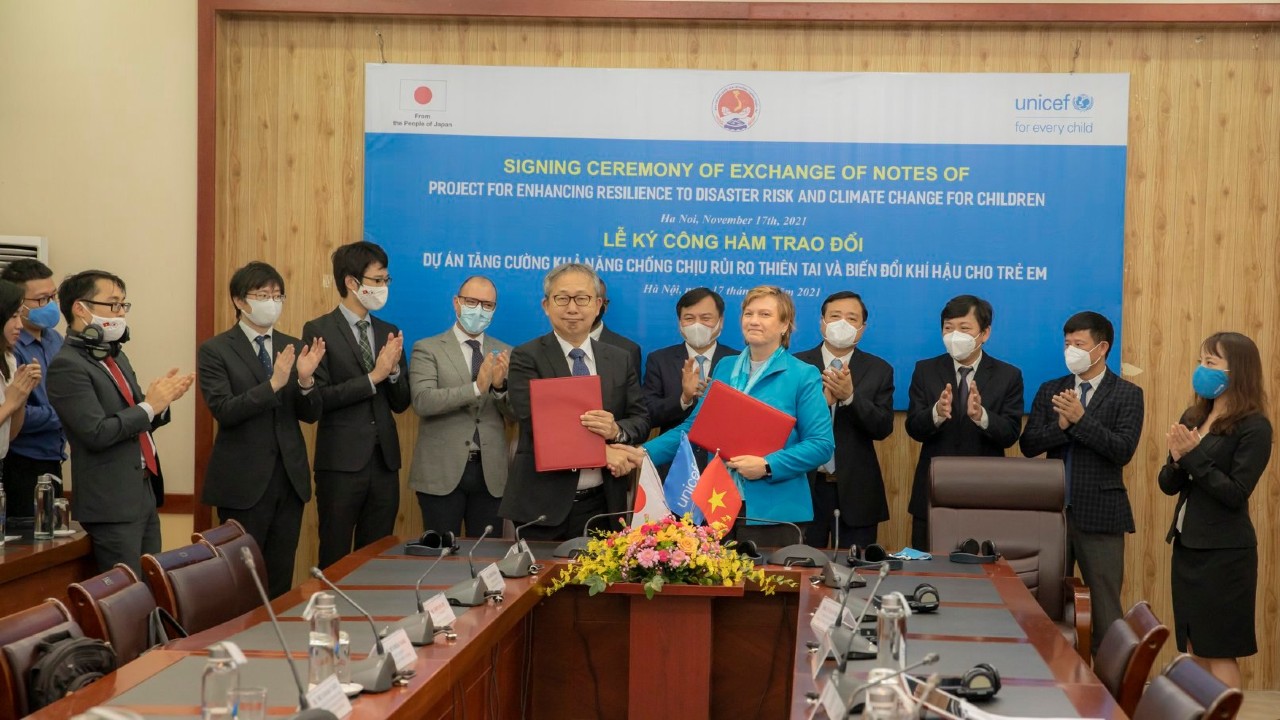HCMC – The Embassy of Japan and the United Nations Children’s Fund in Vietnam (UNICEF Vietnam) launched a four-year project to enhance resilience to disaster risk and climate change for children.
The project aims to strengthen the capacity of institutions to support child-centered and climate-sensitive actions through policy, advocacy and regulatory interventions, which will benefit all children in Vietnam.
The interventions are designed to enhance the capacity of key sectors to effectively respond to children’s needs in an integrated manner, with a focus on climate change, nutrition, water and sanitation, and social and child protection.
The project will be implemented by the Vietnam Disaster Management Authorities of the Ministry of Agriculture and Rural Development, other line ministries and development partners.
“The climate crisis is a child’s rights crisis. Vietnam has been facing climate change-related natural disasters such as droughts and saltwater intrusion in the Mekong Delta region and consecutive storms that caused heavy floods and landslides in the central region last year,” said Rana Flowers, UNICEF Representative in Vietnam.
According to Flowers, children are the least responsible for climate change, yet they will bear the greatest burden of its impact.
UNICEF’s global report issued this year on the Children’s Climate Risk Index shows that children and young people in Vietnam are among those most at risk of the impacts of climate change, threatening their health, education and protection.
Many communities affected by climate change have pre-existing vulnerabilities and have been severely impacted by the Covid-19 pandemic.
The project plans to equip children, families and communities with knowledge and life skills to cope with climate change and natural disasters in the Central and the Mekong Delta regions, especially in the Soc Trang, Ca Mau and Bac Lieu provinces.
An estimated 20,000 people including 9,000 children will benefit from increased access to improved water, sanitation and hygiene services, and 10,000 children under five years of age will be screened for severe acute malnutrition for possible interventions by 2025.
Children will play a central role in this project as agents of change for a safe, clean and green community. The project is aimed at developing climate change and environmental policies with and for children, enabling children’s participation and reducing children’s vulnerabilities and deprivations while advancing progress against international commitments, particularly the Paris Agreement, the Sendai Framework and the Sustainable Development Goals.
The project is also aligned with the Tokyo Strategy 2018 for Mekong-Japan Cooperation, which was adopted by leaders of the Governments of Japan, Cambodia, Laos, Myanmar, Thailand and Vietnam for the 10th Mekong Japan Summit.
“The effects of climate change have already become evident, and we need to address the changes with a sense of urgency. Vietnam has its own vulnerability to the impact of climate change, and in fact, we have already witnessed the damages caused by severe droughts, heavy floods and landslides in Vietnam,” said Yamada Takio, Ambassador of Japan to Vietnam.
“We also need to give due consideration to vulnerable people including children, by improving coordination between the local community and the authorities of the related sectors such as health, sanitation, water and education.”
Nguyen Hoang Hiep, Deputy Minister of Agriculture and Rural Development, said the project marks an important milestone in the strong and long partnership between the Government of Japan, the Government of Vietnam and the UNICEF.
In the coming time, the Ministry of Agriculture and Rural Development hopes that the Japanese Government and UNICEF will continue to share experiences in developing public-private partnership projects to strengthen the resilience of the governance systems and raise awareness of both people and leaders, especially at the local level, to contribute to the promotion of a sustainable and resilient society to natural disasters.
Hiep also suggested that Japan and the UNICEF offer recommendations to the Government of Vietnam on the implementation of the multidisciplinary behavior change communication campaign in disaster risk management.









